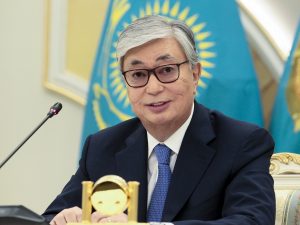When Nursultan Nazarbayev, president of Kazakhstan for almost three decades, announced his resignation on March 19, 2019, Kazakhstanis had no way to expect what would happen next. After all, most people had assumed Nazarbayev would be president for life. While politics in Kazakhstan had always been centered around his persona, the big question of who would come next was also always hanging in the air.
There Nazarbayev was, on March 19, announcing that very moment – the end of his formal rule. He started his resignation speech without delay, saying he had decided to step down as president. On that day, I was home and heard some people celebrating from their balconies. On social media, many people were expressing their disbelief and some were very upset.
After that night things escalated quickly.
The next day, March 20, Kassym-Jomart Tokayev was sworn in as Kazakhstan’s acting president. Tokayev had been speaker of the Senate and second in line for the presidency according to the Kazakh Constitution. That same day he managed to do two things: He nominated Dariga Nazarbayeva, the daughter of the first president, to replace him as Senate speaker and suggested that the capital be renamed from Astana to Nur-Sultan to cement Nazarbayev’s legacy.
March 20 shocked many with the speed of decisions made that would affect the whole country.
“March 20 was like a slap in the face,” Assem Zhapisheva, a journalist and a leader of the youth opposition movement Oyan, Qazaqstan, recalled. “Because it was a peculiar sign for society, for us, that nothing has changed.”
But some things have changed since last year. Kazakhstan had its first presidential election without Nazarbayev on the ballot; the country has also faced multiple crises, numerous nationwide protests, the redistribution of power, the dismissal of Dariga Nazarbayeva from her top position, and a “transition of consciousness.”
The process kicked off by Nazarbayev’s March 19, 2019 resignation is still ongoing and it is hard to predict what will happen next. Currently, the country is facing an unknown future fueled by many factors, including the pandemic crisis and the continuing redistribution and restructuring of power dynamics among the country’s political elite.

































